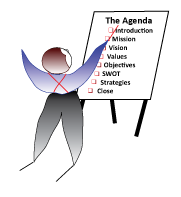Articles & Presentations

You're a What?! by Gary Rush, IAF CPF
A Facilitator?!
In the beginning, back in 1983, I didn’t call myself a “Facilitator”. That name didn’t get used for what I did until 1985. Previously, I was called a Session Leader or Process Leader (both very appropriate names). Once I began to call myself “Facilitator”, the problems began. People didn’t have a clue as to what it was that I did. Worse yet, Hollywood always used the name as a synonym for a hit man from Chicago and I’m from Chicago; imagine that. Even my father used to introduce me as, “This is my son Gary, he is successful, and I think that what he does is legal.” So, I worked hard to get people to understand what a Facilitator was and did. What I do as a Facilitator – my primary goal is to get a group of individuals to form as a team, learn to communicate, and achieve a goal or accomplish a task. What I do as a Facilitator Trainer – I teach individuals not only “how to” I also teach them to understand the “why” so that they can perform as effective Facilitators – essentially “how to” do my job.
The Problem
The use of the name Facilitator is so diluted that focus has shifted from process skills that provide a deliberate structured thought process for better solutions to one that focuses more on people skills. Members of the Association for Training and Development (ATD, formerly known as ASTD) began to call themselves Facilitators instead of Teachers to encourage a more interactive teaching style with their students (after all, facilitate means, to make easier), so confusion grew. What is a “Facilitator?” The International Association of Facilitators (IAF) has worked to clarify the confusion through its IAF Certified™ Professional Facilitator (CPF) program that certifies Group Facilitators, clarifying our role and having it stand out from the crowd, to quote Nick Housego, CPF.
For a while, we were successful in clarifying our role. We were “Group Facilitators”. But, today, too many people call themselves “Facilitator” because again, the definition of facilitation is, “to make easier.” The problem is that most learn how to work with people and group dynamics (people skills), thinking that if you get groups working together, all would be good. They don’t learn the process skills needed for Group Facilitation, which unfortunately, undermines what we do as Group Facilitators.
Process skills are just as important, if not more so, (you don’t want a group of people sitting around getting along, but making poor decisions). This trend has affected the Group Facilitation industry. I know, as an IAF Assessor, I’ve watched Facilitators facilitating workshops noticing that a weakness they all had in common was poor process skills. They all dealt well with people issues, but they all struggled defining a clear process for the group to follow to guide them to a useful outcome.
The Solution
I’ve had to revert to using my term that I created in 1985 – Structured Facilitation – so that people understand that I’m not going to just engage them; I’m also going to provide a structured thought process that guides them assuring useful solutions. I believe in the wisdom of the group – when it comes to the content – however, as a Facilitator, I’m responsible for the process and they count on my process expertise. Effective Facilitators are Process Experts (so calling ourselves Session Leaders / Process Leaders / Group Facilitator / Process Facilitator is also effective). So, when you request someone to facilitate a meeting or workshop to make a decision, develop a strategic plan, elicit requirements, etc., you need to ensure that he or she is well trained in both people and process skills.
People Need Balanced FoCuSeD™ Training
When I train people in my structured facilitation technique, FoCuSeD™, I cover both People Skills and Process Skills – one without the other is fruitless. People need to know “how to” form teams (people skills) and they also need to know “how to” guide teams to a well thought-out solution (process skills). I make sure that my students know “how to” structure an agenda, prioritize, develop a strategic plan, understand business processes, work through stalemates, and “how to” engage in clear communication, problem-solving, decision-making, etc., because these processes help stimulate group involvement ensuring better outcomes.
Process Skills are not “soft” skills. Process Skills provide deliberate, structured thought processes. Effective group facilitation requires a Facilitator / Session Leader / Process Leader / Group Facilitator / Process Facilitator who knows both People and Process Skills – “Structured Facilitation.” ![]()

